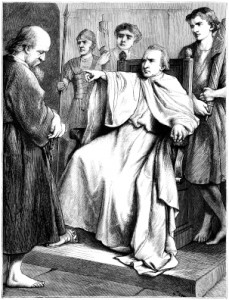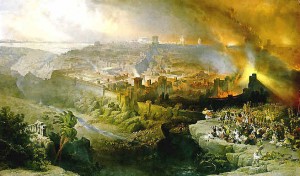 How do you view history? I mean big picture, how do you view it? In other words, do you have a philosophy of history? A philosophy of history is a paradigm for interpreting the purpose and direction of history. It not only seeks to interpret the events of the past but also attempts to place the present in the proper context and give insight into the future. There are a few different major philosophies of history.
How do you view history? I mean big picture, how do you view it? In other words, do you have a philosophy of history? A philosophy of history is a paradigm for interpreting the purpose and direction of history. It not only seeks to interpret the events of the past but also attempts to place the present in the proper context and give insight into the future. There are a few different major philosophies of history.
One philosophy of history holds that history is cyclical. The belief that history repeats itself and that there is not any real progress over time is an example of a cyclical philosophy of history. A cyclical view of history sees such cycles as inevitable because it operates from a presumption that man never really changes. Man is destined to repeat the mistakes of history because man is a prisoner of his nature and never really progresses.
Another view holds that history is linear. An example is Marxism, which teaches that history is on an inevitable progression to the goal of a pure communist society. Marxism attempts to explain the past, place the present in proper context and predict the direction of the future through its philosophy of history. In the Marxist view, it is just a matter of time before the whole world embraces the ideals of the Marxist state.
Many Christians have adopted a pessimistic linear philosophy of history. They see history as on an inevitable regression into sin and rebellion against God. They believe the world is beyond hope, the gospel is destined to fail and evil is destined to prevail on the earth.
It seems to me that the proper Christian philosophy of history holds history is both cyclical and linear. While it recognizes history moves in a cyclical manner, those cycles progress in a linear fashion toward an ultimate positive conclusion. Imagine a bicycle wheel rolling up a ramp to reach a high platform. The same point on the wheel will sometimes be rotating downward, backward, upward or forward around the axle, but the wheel itself is always moving up the ramp to a higher point.
When viewed in the context of this Christian philosophy of history, the last fifty years of American cultural and moral decline are easily explained without compromising the linear view of progression and advancement for the kingdom of God. The last fifty years in the United States of America merely represents a down cycle, whose peak will reach higher in the next cycle as the kingdom progresses towards its ultimate victorious consummation. History, driven by the leavening force of the kingdom of God is like a wave traveling up a beach. There are high points and low points, but it is moving up toward a high consummation.
This view provides the context for understanding history without compromising Jesus’ promise that the Kingdom will successfully leaven the whole earth. Anyway, it makes sense to me. What do you think? GS




